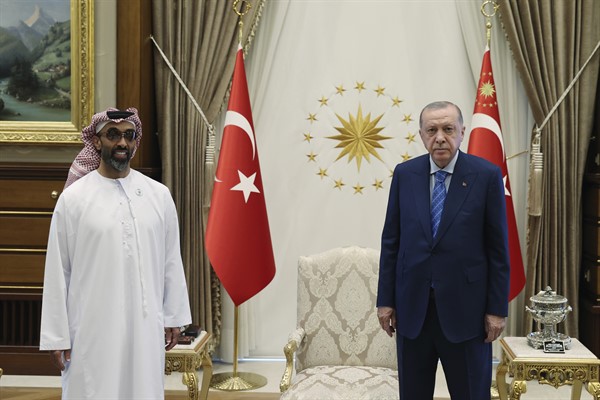This time last year, the United Arab Emirates and Turkey appeared to be on opposing sides of a range of issues spanning the broader Middle East and North Africa region. But recently, leaders from the two countries have started to talk again. Concerns in 2019 and 2020 that a regional “cold war” pitting Emirati and Turkish interests against each other in Libya, the Eastern Mediterranean, the Horn of Africa and even the Caucasus have given way to a thawing of relations. The shift in approach by Abu Dhabi toward deescalating regional points of tension is part of a broader effort by the kingdom’s rulers to recalibrate their foreign policy stance after a period of arguable overextension.
The highest-profile indication of a rapprochement between Abu Dhabi and Ankara was a mid-August visit to Turkey by the UAE’s national security adviser, Sheikh Tahnoon bin Zayed Al Nahyan. Weeks after that trip, Turkish President Recep Tayyip Erdogan held a telephone call with the UAE’s crown prince, Sheikh Mohammed bin Zayed Al Nahyan. Tahnoon is a brother of MBZ, as the crown prince is popularly known, and MBZ has repeatedly entrusted him with responsibility for sensitive regional and international portfolios. In the ongoing—and likely permanent—absence from public life of his half-brother, President Sheikh Khalifa bin Zayed Al Nahyan, since his stroke in 2014, MBZ and a small circle of senior advisers, including Tahnoon, direct most aspects of Emirati policymaking, especially in foreign, security and defense affairs.
Since 2019, the UAE has been pragmatically reassessing its regional posture in response to setbacks its forces have faced in conflict zones like Yemen and Libya, which risked drawing the country deeper into a set of increasingly unwinnable wars. The first sign of this shift came in June 2019, when Abu Dhabi unilaterally drew down most of its direct military presence in Yemen in favor of a less visible but still influential footprint that worked through local political partners and security forces in southern Yemen. In Libya, the moment of truth came in summer 2020, after the UAE’s ally, Gen. Khalifa Haftar, attempted to break out of his stronghold in eastern Libya and capture the capital, Tripoli. That campaign failed largely as a result of a significant escalation in Turkish military and political assistance to the United Nations-backed Government of National Accord.

